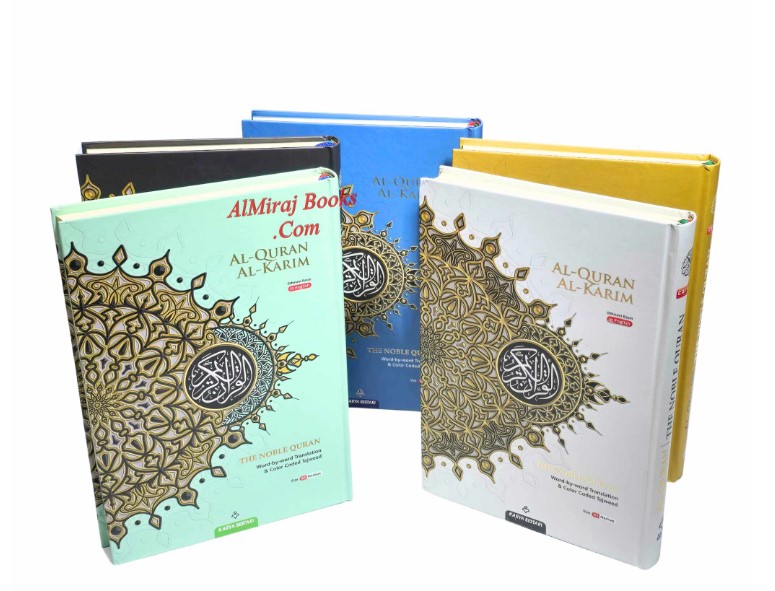Maqdis Quran | The Noble Quran Word By Word Translation and Color Coded Tajweed (Al Quran Al Karim) Large Size A4 (English-Arabic)
Tawhid and the Profound Reality of La Ilaha Illallah
Reflecting on the Foundations of Islamic Monotheism with the Teachings of Muhammad bin Abdul-Wahhab
The statement La Ilaha Illallah—“There is no deity worthy of worship except Allah”—is not simply a formula uttered at conversion, nor a phrase to be repeated without reflection. It is the very foundation of Islamic monotheism (Tawhid), the heart of a Muslim’s Aqeedah (creed), and the axis upon which every aspect of life should revolve.
In his powerful work The Meaning of the Statement of Tawhid (La Ilaha Illallah), the renowned scholar Muhammad bin Abdul-Wahhab revives the essence of this declaration, calling Muslims to strip away cultural, ritualistic, and emotional attachments that compromise pure Tawhid. His message was a call back to clarity—to live the Qur’an as it was revealed, without distortion or deviation.
This post will explore the definition of Tawhid, the deep meaning behind La Ilaha Illallah, and how this principle shapes the believer’s daily life, supported by the enduring relevance of resources such as the Maqdis Quran, which helps us engage with the Qur’an word-by-word and with proper Tajweed.
What is Tawhid? The Foundation of Islamic Belief
Tawhid means to affirm the Oneness of Allah in every way: in His Lordship (Rububiyyah), in His Names and Attributes (Asma wa Sifat), and in His exclusive right to be worshipped (Uluhiyyah).
In Muhammad bin Abdul-Wahhab’s writings, he identifies Tawhid as the single most important concept in Islam. Every Prophet was sent with this message, and every community was warned against shirk (associating partners with Allah). Tawhid is not simply belief in one Creator; it is the active rejection of all other objects of worship besides Allah.
He writes:
“The meaning of La Ilaha Illallah is not merely to affirm that Allah is the Creator, Sustainer, and Administrator of the universe, for even the idolaters believed this. Rather, it is to affirm that none is worthy of ibadah (worship) except Allah alone, without any partner.”
Understanding La Ilaha Illallah: The Negation and the Affirmation
This powerful statement has two critical components:
- Negation: La Ilaha – There is no deity (negating all other false gods, desires, and objects of worship).
- Affirmation: Illallah – Except Allah (affirming that worship belongs to Him alone).
This dual aspect forms the essence of Tawhid al-Uluhiyyah—declaring Allah alone as the One to be obeyed, relied upon, feared, loved, and invoked. It demands action: abandoning all rituals, practices, and beliefs that direct any form of devotion to other than Allah.
Muhammad bin Abdul-Wahhab warns against taking this statement lightly. It is not enough to say it; one must live by it. It must purify one’s belief, align one’s heart, and direct one’s worship.
Tawhid in the Qur’an: A Living Proof
Understanding Tawhid is inseparable from understanding the Qur’an. That’s where tools like the Maqdis Quran become invaluable. This beautifully crafted Quran edition features:
- Word-for-word translation, helping readers understand the exact meaning of each Arabic word.
- Color-coded Tajweed, guiding correct recitation and enhancing spiritual experience.
- English-Arabic side-by-side presentation, making it accessible for non-Arabic speakers and students of Islamic knowledge.
When we read the Qur’an with such clarity, the message of Tawhid becomes impossible to ignore. Surah after Surah, verse after verse, calls us to recognize Allah’s Oneness and warns against falling into shirk in its many forms—whether subtle or obvious.
Daily Life Through the Lens of Tawhid
Tawhid is not just a theological concept. It is a worldview that reshapes how we live. Here are ways it transforms daily life:
1. Worship with Sincerity
Every act of ibadah—salah, du’a, fasting, charity—must be performed solely for Allah. As Muhammad bin Abdul-Wahhab teaches, even hidden intentions or associating intermediaries in worship can nullify one’s devotion.
2. Dependence and Trust
Tawhid ar-Rububiyyah means we acknowledge that only Allah controls provision, health, success, and hardship. This strengthens our reliance on Him and detaches our hearts from the fear of creation.
3. Gratitude and Humility
Recognizing that every blessing comes from Allah increases our thankfulness. We stop attributing success to luck or people, and instead attribute it to Allah, Ar-Razzaq (The Provider) and Al-Hakeem (The Wise).
4. Clarity in Purpose
Tawhid gives us a clear compass in life: everything we do—whether in our careers, family life, or interactions—is an opportunity to earn Allah’s pleasure and affirm His Oneness through obedience and sincerity.
Beware of Shirk: The Opposite of Tawhid
Just as the Qur’an and the Sunnah emphasize Tawhid, they also highlight the danger of shirk. It is the one sin Allah has promised not to forgive if a person dies upon it.
Shirk can be:
- Major shirk – Directing worship to others besides Allah.
- Minor shirk – Showing off in worship, swearing by other than Allah, or relying on superstitious charms.
- Hidden shirk – Relying inwardly on someone or something else when help should be sought from Allah alone.
The Maqdis Quran, with its word-by-word guidance, helps readers stay alert to these dangers by showing how Allah continuously refutes these errors in the Qur’an, often by exposing the futility of relying on idols, ancestors, or intermediaries.
Conclusion: Reviving Tawhid in Our Lives
Tawhid is the path to peace, purpose, and Paradise. It is the distinguishing feature of a believer and the reason for our creation. Muhammad bin Abdul-Wahhab’s emphasis on reviving the correct understanding of La Ilaha Illallah is as essential today as it was in his time. His teachings, paired with practical tools like the Maqdis Quran, empower us to align our beliefs and actions with the truth.
As Muslims, our journey should be a continuous effort to purify our Aqeedah, understand the Qur’an deeply, and live lives anchored in Tawhid. For in it lies our ultimate success—in this life and the hereafter.













